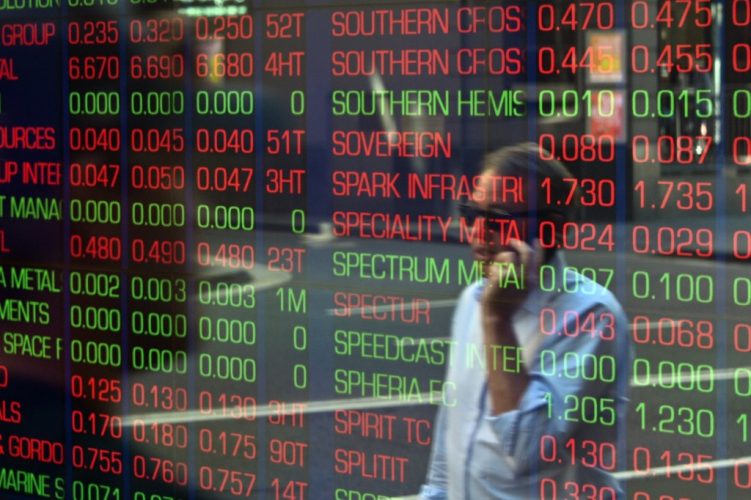Stocks in Asia and the Pacific were down mainly on Monday, as investors await crucial economic data on Tuesday such as the latest US inflation figure.
The Nikkei in Japan finished 0.9% lower to 27,427.92, while the Topix was down close to 0.5% at 1,977.67 after news that the US had shot down another object flying at high altitude added to global tensions.
The yen was volatile ahead of a vote on Tuesday for Kazuo Ueda to become the next Bank of Japan governor, while the yield on 10-year Japanese government bonds was at 0.5%, near the upper level of BOJ tolerance.
In Hong Kong, the Hang Seng Index slipped marginally, although the tech sector index rose 0.5%. In Shanghai, the Composite rose 0.7% to 3,284.16 while the Shenzhen Component was also up by 1.14%.
In Australia, the S&P/ASX 200 was down 0.2% while New Zealand shares also dropped as the country was hit by a tropical cyclone.
And in India, the Nifty 50 fell by nearly 0.5% to close at 1.7770.9. Shares in the Adani Group companies remained under pressure on Monday amid reports it has halved its revenue growth target. Adani Enterprises fell 3%, while Adani Total Gas, Adani Power and Adani Transmission lost 5% each.
Adani Total, a joint venture with France’s TotalEnergies, has lost 70% since the scathing Hindenburg report, while Adani Enterprises is down 50%.
ALSO SEE:
China Claims US Flew High-Altitude Balloons Over its Airspace
Globally shares were relatively steady, while the dollar rose on Monday, amid expectation that US inflation data could define the outlook for global interest rates.
Equities rallied over the first weeks of 2023, buoyed by enthusiasm over the prospect of a peak in inflation – and rates – as well as evidence of ongoing U.S. growth that has suggested the economy could be in for a soft landing.
But that optimism ran into a brick wall the week before last when the Federal Reserve reiterated its message that the war on inflation is not over, and after the January jobs report depicted a red-hot labour market.
The MSCI All-World index, which gained almost 10% in the first five weeks of the year, fell by nearly 1.5% last week. It was last flat on the day at 646.59 points. On Monday it was up 1.13%.
All eyes on US CPI
US data on consumer prices and retail sales this week could prove a key catalyst for near-term direction for the markets, with much resting on whether inflation continued to slow in January.
Median forecasts are for headline and core consumer prices to rise 0.4% for the month, with sales rebounding by 1.6%.
Risks could be to the upside given a re-analysis of seasonal factors released last week saw upward revisions to CPI in December and November. That lifted core inflation on a three-month annualised basis to 4.3%, from 3.1%.
There were also changes to the weightings for shelter costs and used car prices which might bias the CPI higher.
“Markets have again tripped up over their over enthusiasm for a Fed and other central bank rate pivots, with this week’s CPI and retail sales expected to suggest that inflation has picked up in month-on-month terms and that U.S. consumer spending is proving rather more resilient,” ADM Investor Services chief global economist Marc Ostwald said.
Stocks up in Europe
In Europe, shares rose, led by gains in industrial and defence stocks, pushing the STOXX 600 up 0.3%. The index fell almost 1% last week.
US stock index futures rose between 0.1-0.2%.
Markets have already sharply raised the profile for future tightening by the Federal Reserve, with rates now seen peaking up around 5.15% and cuts coming later and slower.
There is also a full slate of Fed officials speaking this week to provide a timely reaction to the data.
Yields on 10-year Treasuries are at five-week highs of 3.75%, having jumped 21 basis points last week, while two-year yields hit 4.51%.
That shift helped stabilise the dollar, especially against the euro which slipped 1.1% last week and extended the retreat on Monday to a five-week low of $1.0656. That was well away from its early February high of $1.0987.
The dollar also got a leg up on the yen on reports Japan’s government was likely to appoint academic Kazuo Ueda as the next Bank of Japan governor.
The surprise news sparked speculation about an early end to the BOJ’s super-easy policies, though Ueda himself later said it was appropriate to maintain the current stance.
The dollar was last up almost 0.8% at 132.40 yen, after bouncing from a trough of 129.80 on Friday.
The rise in yields and the dollar weighed on gold, which fell 0.3% to $1,858.30 an ounce compared to an early February peak of $1,959.
Oil prices ran into fresh selling, having jumped on Friday when Russia said it planned to cut its daily output by 5% in March after the West imposed price caps on Russian oil and oil products.
Brent crude fell almost 1% to $85.54 a barrel, while US futures fell 1.1% to $78.89.
- Jim Pollard with Reuters
ALSO SEE:
All Eyes on India Market Regulator Amid Adani Share Sale Probe
China New Bank Loans Hit Record $720 Billion in January
Yen Shoots up as Ueda Nominated as New Bank of Japan Chief
China Tightens Banks’ Reporting Rules to Classify Risks Better
Chinese Manufacturing Yet to Pick Up, Factory Prices Drop
























